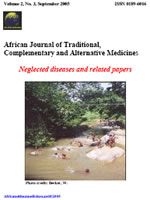
|
African Journal of Traditional, Complementary and Alternative Medicines
African Ethnomedicines Network
ISSN: 0189-6016
Vol. 14, No. 1, 2017, pp. 16-23
|
 Bioline Code: tc17003
Bioline Code: tc17003
Full paper language: English
Document type: Study
Document available free of charge
|
|
|
African Journal of Traditional, Complementary and Alternative Medicines, Vol. 14, No. 1, 2017, pp. 16-23
| en |
THE EFFECT OF CAFFEINE SUPPLEMENTATION ON TRAINED INDIVIDUALS SUBJECTED TO MAXIMAL TREADMILL TEST.
Salicio, Viviane Martins Mana; Fett, Carlos Alexandre; Salicio, Marcos Adriano; Brandão, Camila Fernanda Costa Cunha Moraes; Stoppiglia, Luiz Fabrizio; Fett, Christiane Rezende & Botelho, Clovis
Abstract
Background: Intense physical training increases oxidative stress and inflammation, resulting into muscle and cellular
damage. The aim of this study was to analyze the effect of caffeine supplementation on trained young individuals
subjected to two treadmill maximal tests.
Materials and Methods: It was a double-blind and crossover study comprising 24 active individuals within the age
group 18-30 years. The comparisons were conducted: the effect of exercise (week 1 x 2) and caffeine intake (GC x GP)
on thiobarbituric acid (TBARS), interleukin 6 (IL-6), interleukin 10 (IL-10) and superoxide dismutase (SOD) variables
during pre-exercise time (30 min. after caffeine or placebo intake) and post-exercise (5 min after treadmill test).
Results: The comparison between weeks 1 and 2 showed increase in the first week, in the following items: TBARS,
IL-6 and IL-10 in the GC and GP groups. The comparison within the same week showed that GC individuals presented
lower post-exercise TBARS values in the first and second weeks; IL- 6 presented higher post-exercise values in the GC
group in both weeks. The paired analysis comparing pre- and post-exercise, with and without caffeine showed that IL-6
presented higher post-exercise values in the GC group.
Conclusion: Caffeine used by athletes can decrease oxidative stress. The increased IL-6 suggest that this ergogenic
supplement may stimulate muscle hypertrophy, since IL-6 has myokine effect. However, the caffeine effect on IL-6
level and muscle hypertrophy increase should be better investigated in future studies.
Keywords
Caffeine; Exercise; Interleukin; Oxidative stress
|
| |
© Copyright [2017] - African Journal of Traditional, Complementary and Alternative Medicines
Alternative site location: http://journals.sfu.ca/africanem/index.php/ajtcam
|
|
